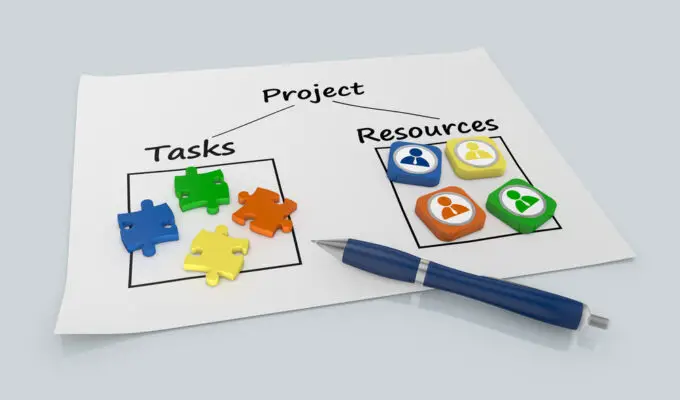According to Built In, the average salary for a Technical Project Manager in Remote is $140,716, with an average additional cash compensation of $14,256, making the average total compensation $154,972. However, they do not provide a specific number of Technical Project Manager Remote jobs in the US.
On the other hand, according to the US Bureau of Labor Statistics, there were 881,300 Project Management Specialist jobs in the US in 2022, with a projected job outlook of 6% growth from 2022-2032, which is faster than average. However, this source does not provide information specific to Technical Project Manager Remote jobs.
Lastly, ZipRecruiter reports that as of October 4, 2023, the average annual pay for a Remote Project Manager in the US is $98,788. However, this source is not specific to Technical Project Manager Remote jobs.
Looking for remote job opportunities as a Technical Project Manager? You’re in luck! In this article, we’ll explore the world of remote work for Technical Project Managers.
From the definition of the role to the benefits and drawbacks of working remotely, we’ve got you covered.
Discover what to expect as a remote Technical Project Manager and how cross-functional teams operate in the remote workplace.
Definition of a Technical Project Manager
A technical project manager is responsible for overseeing and managing the technical aspects of a project. They must have a strong understanding of the project’s objectives, scope, and deliverables, as well as technical knowledge and expertise in the relevant field.
They work closely with the project team to ensure that all technical requirements are met, deadlines are adhered to, and any technical issues or risks are addressed and resolved.
Additionally, a technical project manager may coordinate and collaborate with stakeholders, such as clients, vendors, and other departments, to ensure effective communication and alignment throughout the project lifecycle.
They must also possess strong leadership and organizational skills to manage resources, budgets, and timelines effectively.
In a nutshell, a Technical Project Manager is responsible for overseeing the planning, execution, and delivery of technical projects within an organization.

Overview of Remote Job Opportunities for Technical Project Managers
As a technical project manager, you have numerous remote job opportunities available to you. Remote jobs for technical project managers can be found in various industries and sectors, offering flexibility and the ability to work from anywhere.
These job opportunities require a combination of technical skills and project management experience. As a remote project manager, you’ll be responsible for overseeing and managing the technical aspects of a project from start to finish, ensuring its successful completion.
With the increasing demand for remote work, the number of remote job opportunities for technical project managers is on the rise, providing you with a wide range of options to choose from.
Job Description
Now let’s discuss the job description for a remote technical project manager role.
To be successful in this position, you’ll need to have the necessary qualifications and skills, such as strong communication and leadership abilities, as well as technical expertise in the relevant field.
Your responsibilities will include overseeing project timelines, managing resources, and ensuring deliverables are met.
Ultimately, the goal of this role is to execute projects and meet client expectations while working remotely successfully.
Qualifications and Skills Needed
You should possess the necessary qualifications and skills to qualify for a technical project manager remote job. Here are some key requirements for this role:
- Strong project management skills: You should have experience managing technical projects, ensuring they’re delivered on time, within budget, and meeting the project scope and requirements.
- Ability to work remotely: Remote jobs require self-discipline, time management, and collaboration with cross-functional teams in a virtual setting.
- Organizational skills: As a technical project manager, you’ll coordinate multiple tasks, resources, and timelines. Strong organizational skills are essential for success.
- Technical expertise: A solid understanding of technical project requirements and communicating effectively with technical teams is crucial.
- Excellent communication skills: You should be able to articulate project goals, expectations, and progress to stakeholders and team members, both verbally and in writing.
Responsibilities and Duties
You will regularly oversee and manage the responsibilities and duties of a technical project manager remote job.
As a project manager, your main responsibility is ensuring project completion in a remote work environment. This includes coordinating with the project team to define project objectives, create project schedules, and allocate resources effectively.
You’ll be responsible for tracking the progress of projects and making necessary adjustments to ensure they stay on track. Your duties also include identifying and mitigating risks, communicating with stakeholders, and ensuring that projects are delivered within budget and on time.
A strong track record in technical project management and a proven ability to deliver successful outcomes are essential for this role.
Goals/Expectations for the Role
As a technical project manager in a remote job, you’ll regularly evaluate and set clear goals and expectations for the role. Here are five key expectations and goals for a technical project manager in a remote job:
- Drive successful project completion by effectively managing resources, timelines, and deliverables.
- Foster a team-oriented environment by promoting collaboration and effective communication among remote team members.
- Stay up-to-date with cutting-edge technology and industry trends to ensure projects are executed using the most innovative solutions.
- Demonstrate strong project management skills, including planning, organizing, and monitoring project progress.
- Meet or exceed client expectations by delivering high-quality projects on time and within budget.
In this full-time role, you’ll have the opportunity to work in a hybrid remote environment and contribute to the success of projects in the performance digital marketing industry.
Benefits and Drawbacks to Working Remotely as a Technical Project Manager
Working remotely as a technical project manager comes with its fair share of benefits and drawbacks.
On the one hand, you have the advantage of flexibility and the ability to work from anywhere, which can greatly improve your work-life balance.
However, there are also challenges, such as communication barriers and the potential for feeling isolated from the team.
Advantages of Working Remotely
One major advantage of remote work for technical project managers is the increased flexibility in scheduling and location.
As a remote job full-time employee or a hybrid remote job full-time employee, you have the freedom to choose when and where you work. This flexibility allows you to create a work-life balance that suits your needs and preferences.
Additionally, as a freelance project manager or someone running a freelance project management business, remote work gives you the opportunity to work with clients from all over the world, expanding your professional network and potential projects.
Project management software allows for easy collaboration and progress tracking, regardless of location.

Challenges of Working Remotely
Remote technical project managers often face numerous challenges and drawbacks while working remotely. While working remotely has many benefits, such as flexibility and increased productivity, some challenges come with the territory.
One of the main challenges is communication. As a technical project manager, your job is to ensure that all team members are on the same page and working towards a common goal.
This can be more difficult when everyone is working remotely. Another challenge is managing time and priorities. Without the structure of a traditional office environment, it can be easy to get distracted or overwhelmed with tasks. Lastly, there may be a lack of visibility and recognition for your work, as you are not physically present in the office.
| Challenge | Description | Solution |
|---|---|---|
| Communication | Ensuring effective communication among team members | Utilize video conferencing tools and establish regular check-ins |
| Time Management | Managing time and priorities without the structure of a traditional office | Set clear goals and create a schedule |
| Lack of Visibility | Limited visibility and recognition for your work | Provide regular updates to stakeholders and share achievements |
Employment Expectations for Technical Project Managers
When considering employment expectations for technical project managers, it’s important to understand the differences between full-time and part-time positions.
Full-time positions typically offer more stability and benefits, while part-time positions may provide more flexibility.
Additionally, pay scale expectations can vary depending on factors such as experience, industry, and location.
Full-Time vs Part-Time Positions
If you’re a technical project manager, you may be wondering about the differences between full-time and part-time positions and what employment expectations come with each. Here are some key points to consider:
- Full-time employees typically work 40 hours per week, while part-time positions offer a more flexible schedule.
- Remote jobs are available for both full-time and part-time technical project managers, providing opportunities to work from anywhere.
- Technical project managers need strong project management skills to succeed in either position.
- Customer expectations and delivering a great customer experience are important in both full-time and part-time roles.
- Full-time positions generally offer higher employment opportunities and full-time pay, while part-time positions may offer more flexibility and work-life balance.
Understanding the differences between full-time and part-time positions can help you decide which type of employment opportunity is right for you as a technical project manager in the remote job market.
Pay Scale Expectations
Consider your pay scale expectations as a technical project manager in the remote job market. As you navigate the opportunities available, it is important to understand the potential compensation you can expect clearly.
The pay scale for technical project managers in remote jobs can vary depending on factors such as experience, industry, and location. To give you an idea of what to expect, take a look at the table below:
| Experience Level | Average Annual Salary |
|---|---|
| Entry-level | $70,000 – $90,000 |
| Mid-level | $90,000 – $120,000 |
| Senior-level | $120,000 – $150,000+ |
It’s worth noting that these figures are just averages and can vary based on several factors. Ultimately, your pay scale will depend on your skills, qualifications, and the specific company you work for.
Cross-Functional Teams in the Remote Workplace
When it comes to managing cross-functional teams in a remote workplace, effective communication is key.
You need to establish clear communication channels and encourage open dialogue to ensure everyone is on the same page.
Additionally, managing resources across multiple teams requires careful planning and coordination to ensure that tasks are assigned and completed efficiently.
Requirements for Effective Communication with Teams
To effectively communicate with cross-functional teams in the remote workplace, it’s crucial that you establish clear channels of communication and foster collaboration. Here are some requirements for effective communication with teams in a remote setting:
- Strong project management skills: As a technical project manager, you need to have a solid understanding of project management principles and be able to apply them effectively in a remote environment.
- Excellent interpersonal skills: Building relationships and rapport with team members is essential for effective communication. This includes active listening, empathy, and adapting your communication style to different team members.
- Well-defined project team roles: Clearly defining each team member’s roles and responsibilities helps avoid confusion and ensures that everyone understands their role in the project.
- Regular check-ins and updates: Regularly scheduled meetings and progress updates keep everyone on the same page and allow team members to ask questions or raise concerns.
- Utilization of collaboration tools: Leveraging tools such as project management software, communication platforms, and file-sharing systems can enhance communication and collaboration within the team.
Managing Resources Across Multiple Teams
To effectively manage resources across multiple teams in the remote workplace, establish clear channels of communication, and foster collaboration.
As a project manager, ensuring that all teams are aligned and working towards the same goals is crucial. One way to achieve this is by utilizing online project management groups, where teams can share updates, ask questions, and collaborate on tasks.
Additionally, as an experienced project manager, you should consider implementing program management techniques to ensure efficient delivery of projects.
This involves coordinating resources, prioritizing tasks, and monitoring progress across multiple teams. To provide a clear picture of resource allocation, use the table below to visualize the distribution of resources across different teams in digital technology projects.
| Team | Resources Allocated |
|---|---|
| Development | 8 |
| Design | 4 |
| QA | 2 |
| Support | 3 |
Frequently Asked Questions
What Qualifications and Skills Are Typically Required for a technical project manager role?
Typically, for a technical project manager role, you’ll need qualifications like a bachelor’s degree in a relevant field, strong leadership skills, and experience in managing complex projects.
Additionally, skills in communication, problem-solving, and technical knowledge are important.
How Does Remote Work Impact the Communication and Collaboration Aspects of Managing a Technical Project?
Communication and collaboration may be more challenging when managing a technical project remotely. However, you can still effectively coordinate with team members and ensure project success with the right tools and processes.
Are There Any Specific Tools or Software Commonly Used by Remote Technical Project Managers to Facilitate Project Management and Team Coordination?
Various tools and software are commonly used by remote technical project managers to facilitate project management and team coordination.
These tools help streamline communication, track progress, and ensure effective collaboration among team members.
What Are Some Potential Challenges or Obstacles That Remote Technical Project Managers May Face, and How Can They Be Overcome?
Some potential challenges remote technical project managers may face include communication gaps and a lack of team cohesion.
These can be overcome by using collaboration tools, scheduling regular video meetings, and promoting open communication among team members.
How Does the Compensation and Salary Range for Remote Technical Project Managers Compare to Those Working in Traditional Office Settings?
The compensation and salary range for remote technical project managers can vary compared to those in traditional office settings. Factors such as location, experience, and company size all play a role in determining remote compensation.

Conclusion
Working remotely as a technical project manager offers various benefits, such as flexibility, increased productivity, and reduced commute time.
However, it also comes with drawbacks like potential communication challenges and the need for self-discipline.
Despite these challenges, remote work is becoming increasingly common in today’s digital age, and with the right skills and mindset, technical project managers can thrive in a remote work environment while effectively managing cross-functional teams.

Chris Ekai is a Risk Management expert with over 10 years of experience in the field. He has a Master’s(MSc) degree in Risk Management from University of Portsmouth and is a CPA and Finance professional. He currently works as a Content Manager at Risk Publishing, writing about Enterprise Risk Management, Business Continuity Management and Project Management.

